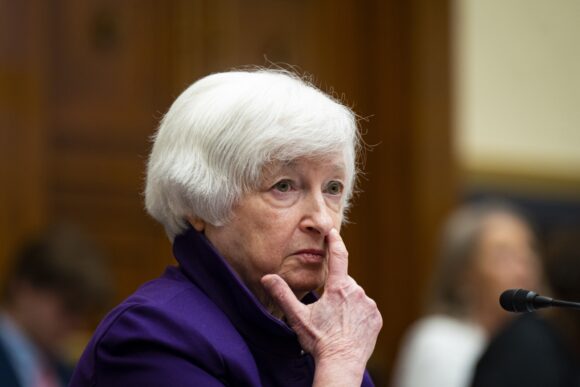
The finance industry will be shielded from the full scope of the European Union’s most consequential piece of ESG legislation to date, as the bloc settles on a compromise to help it get the bill over the finish line.
Under the Corporate Sustainability Due Diligence Directive, large companies face civil liability for environmental and human rights violations in their value chains. Whether to include banks, insurers and asset managers had been a major hurdle in arriving at a deal.
According to the compromise announced on Thursday, the financial sector will be “temporarily excluded from the scope of the directive, but there will be a review clause for a possible future inclusion of this sector based on a sufficient impact assessment,” the Council of the EU said in an emailed statement.
The decision follows a proposal by Spain, which holds the EU’s rotating presidency, that the finance sector get a reprieve from CSDDD’s initial rollout in order to reach consensus before the end of the year. Lawmakers, member states and the commission want the process finalized before next year’s EU elections.
Lara Wolters, the lawmaker who spearheaded the legislation in the EU Parliament, said she and her team “deplore” the decision announced on Thursday.
The upshot now is “that the financial sector — banks, insurers and asset managers — will not have the same obligations as other types of companies to address impacts,” she said in an emailed statement.
A spokesperson for the European Banking Federation declined to comment.
Victor Van Hoorn, head of the Brussels office for ICI Global, an industry association representing investment managers, said the compromise reflects “a more thoughtful approach” and acknowledges “the diversity of financial institutions and activities, some of which are not based on contractual arrangements.”
Eelco van der Enden, chief executive of the Global Reporting Initiative, said the deal “recognizes the challenges for financial institutions of implementing ambitious regulations.” The hope, however, is that over time, banks, asset managers and insurers will be included on an equal footing with other industries, he said.
Amandine Van Den Berghe, a lawyer at nonprofit ClientEarth, called the carve-out for the finance sector “completely ridiculous,” in an emailed comment. It “ignores industry’s own widespread pleas for equal treatment under the law.”
While the wider directive is “ground-breaking,” it’s “shocking that member states have sunk plans to ensure that banks stop investing in environmental and human rights abuses,” said Arianne Griffith, corporate accountability lead at Global Witness.
International Scope
The directive’s international implications have raised concerns among member states including France, which warned it could hurt the competitiveness of EU firms. Outside the bloc, Treasury Secretary Janet Yellen has also warned of the potential “negative, unintended consequences” facing US firms due to the scope of CSDDD.

Under the compromise agreement, the directive will apply to companies with more than 500 employees and global revenue of at least €150 million ($163 million). Non-EU companies are in scope if they generate at least €300 million in sales in the EU, according to the council statement.
Companies found to have breached CSDDD stand to pay fines of 5% of their revenue.
A list of non-EU companies that fall under the directive’s scope will be provided by the European Commission.
Due diligence has been around for a long time, but the directive brings “teeth” to what has largely been a voluntary practice, said Kevin Franklin, managing director for ESG at assurance provider LRQA. The directive also requires disclosure, which labor and environmental laws don’t, and thanks to social media “it’s very easy to look up as to whether or not a company is complying,” he said.
Lawyers advising the finance industry warned that civil liability remains a risk, despite the CSDDD compromise.
There may still be an indirect impact as “business relationships seek to cascade obligations or request information,” according to James Marlow, managing associate at Linklaters. Additionally, “there will effectively be diligence requirements imposed” under other regulations, namely the EU’s Corporate Sustainability Reporting Directive, he said.
CSDDD will require the finance industry — like other sectors — to develop net zero transition plans. Banks, asset managers and insurers will also face civil liability for any violations by suppliers. But the industry won’t be held accountable for ESG violations by clients or companies in which it invests, representing a key concession that bankers had lobbied hard to secure.
Photograph: Offices in Frankfurt. Photo credit: Alex Kraus/Bloomberg
Related:
Copyright 2023 Bloomberg.
Interested in Carriers?
Get automatic alerts for this topic.





